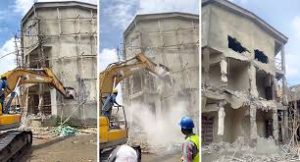Lagos Starts Demolitions of Trade Fair Plaza: Traders’ Lament and Government’s Defense
A dramatic scene unfolded yesterday at the New Mandela Plaza within Lagos’s Trade Fair Complex as the Lagos State government carried out a demolition of over 20 buildings. . Security was tight, with a visible show of force from the Lagos State Task Force, Rapid Response Squad, and other tactical units. Access to the area was restricted, and traders who attempted to document the operation say they faced stern warnings as bulldozers moved in.
The Demolition: What Happened
- Scope: Reportedly, no fewer than buildings in the plaza were reduced to rubble. Each structure was valued at over ₦180 million, according to traders’ accounts.
- Security: Dense security convoys guarded the operation. Access roads into the plaza were closed off, and traders faced dispersal as the demolition continued.
- Timeline: By the time Beadysword’s blog report was filed, several targeted structures had already been demolished, and goods locked inside shops were destroyed along with the buildings.



Traders’ Reactions: Losses and Frustration
- Notice and Due Process: A common thread among the traders was the claim that they did not receive prior notice. “We don’t even know the reason for the demolition,” one trader lamented. Another suggested that the structures might have violated canal setback rules, even though the Lagos State and federal government authorities had sold these lands with all the necessary documents, only to return years later to demolish them.
“They didn’t care that we are in a lease agreement with the federal government. But since the Lagos State government moved to revoke the concession agreement for the Lagos International Trade Fair Complex in 2017, it has been heartbreaking for Igbo traders in the market,” he said.
- Financial Impact: Traders emphasised the personal and financial toll—many borrowed funds from banks to build or expand businesses. With over 20 buildings gone, the question of loan repayment and business continuity looms large.
- Voices from the Ground:
- Chief Magnus Ike, CEO of Magnus Merchandise, insisted he had federal approval and argued that due process should be followed. “If there is any problem, the proper thing is to notify us,” he said, noting that he had no prior state notice.
- A relative of a property owner described the scene as chaotic, with tear gas and sudden enforcement masking what had been a long-standing enterprise.
Government’s Position: Why the Demolition Happened
- Official Rationale: Jubril Gawat, Senior Special Assistant on New Media to Governor Babajide Sanwo-Olu, stated that the demolitions targeted illegal developments, structures lacking statutory approvals, defective constructions, and buildings erected on road setbacks and drainage corridors.
- Agency Involvement: The operation was a coordinated effort among the Ministry of Physical Planning, Lagos State Building Control Agency, Lagos State Urban Renewal Agency, and the Lagos State Physical Planning Permit Authority, with security support on site.
- Immediate Aftermath: The Lagos State Government subsequently ordered a halt to ongoing demolitions and directed a stop to new constructions, signalling a possible review or moratorium as discussions with market leadership proceed.
Takeaways for Lagos Businesses and City Planning
- Compliance and Notices: The incident underscores the importance of obtaining adequate approvals and following due process for urban developments, especially in dense commercial zones with critical infrastructure like drainage and setbacks.
- Communication Gaps: Traders’ complaints about the lack of prior notice highlight a need for clearer, more transparent communication between authorities and business owners before disruptive actions.
- Balance Between Development and Livelihoods: The episode illustrates the friction that can arise between urban renewal efforts and the livelihoods of local business owners. Transparent processes, fair notices, and support mechanisms can help mitigate such tensions.
As Lagos continues to evolve as a major commercial hub, the question remains: how can city planners reconcile rapid development with the rights and livelihoods of traders who have invested years and sums into their enterprises? which many of them use their money to develop these markets but will end upo dominated by the state government. The ongoing talks between market leadership, who are mainly Igbos and the Lagos State Government will be pivotal in shaping a more collaborative and predictable framework for future developments.



